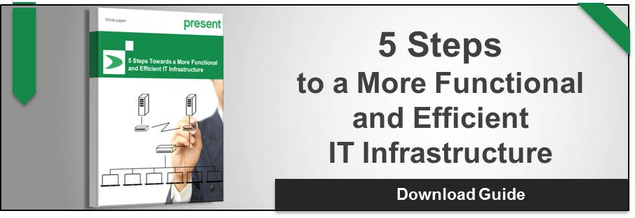Present Blog – IT Thought Leadership
Blog Present-IT thought leadership
Blog Present-IT thought leadership
IT thought leadership blog for CIOs and CTOs in Canada seeking resources to drive IT as a business contributor: hybrid cloud, infrastructure, managed services and security and IT recruitment.
Choosing a Recovery Technology: a balance between efficiency and cost
present For many companies, price is a crucial factor in the choice of recovery technology, however there needs to be a balance between this and desired efficiency.
For many companies, price is a crucial factor in the choice of recovery technology, however there needs to be a balance between this and desired efficiency.
When it comes to recovery, even the concept of TCO (Total Cost of Ownership) does not take into account the costs for non-availability of services, which are those that are likely to accumulate the fastest.
That is why it is necessary to have a global view of business processes and the company's IT infrastructure needs in order to find the recovery technology that provides the best balance between efficiency and cost.
3 factors to consider in order to achieve a cost / efficiency balance
With the goal to optimize and to reach a balance between recovery solution cost and efficiency, many elements are taken into account.
• No recovery technology alone constitutes the ideal solution for all applications, workloads or different levels of service required.
• We must be able to not only determine in what situation which technology is preferred, but also how these technologies work together to provide a comprehensive protection.
• The virtual machine (VM) has become the new standard for server provisioning and efficient system restore following an incident compared to physical machines. Companies therefore need to consider the impact of this consolidation and the new, more economic opportunities now available to them in terms of achieving their required continuity and recovery of application services.
RTO / RPO: 2 metrics often neglected but essential
When it comes to metrics associated with the availability of application services, there are essentially two measurements to consider:
• Recovery Time Objective (RTO)
• Recovery Point Objective (RPO)
These values are often miscalculated and disassociated from the reality of the business. For example, the RTO for email service will often be estimated at 24 hours, whereas in reality an unavailability of 4-5 hours could have a major impact on all business processes.
Adequately defining these values is essential to choosing the right recovery solution. Only an impact analysis of your business processes can establish the actual values of RTO and RPO.
3 Recovery Scenarios (unscheduled service stops) and their solutions
Overall we can distinguish three types of incidents or damages that require recovery

Conclusion
Companies need to consider the impact of consolidation and the new, more economic opportunities now available to them to achieve their required continuity and recovery of application services.
If traditionally continuity management was cumbersome and costly in terms of equipment, software and specialized resources, today, complete solutions that take advantage of server virtualization can meet the requirements of various incident types and the most demanding service levels obligations much more economically.
Contact us for an analysis and/or information on the above-mentioned technologies.
© kjekol - Fotolia.com
About Blog
The right use of technology addresses business challenges and drives business growth in all areas of an enterprise. We hope this blog will offer insight into developing strategies and tactics to enable you to identify those key drivers of growth and keep pace with and anticipate the rapid technology change of today.
Posts by Topic
- IT infrastructure (116)
- IT security (93)
- IT Innovation (59)
- Trends (51)
- Cloud (47)
- Managed services (46)
- Mobility (38)
- Digital transformation (29)
- CIO/IT leaders (28)
- Events (28)
- News (23)
- Microsoft 365 (17)
- Security (17)
- IBM (16)
- Disaster recovery (DR) (14)
- High availability (12)
- Recruitment (12)
- Storage (12)
- Big Data (11)
- Collaboration (11)
- AI (10)
- Case study (9)
- Office 365 (9)
- BYOD (8)
- Customer Experience (8)
- Hybrid Cloud (7)
- Current events (6)
- SAP Hana (5)
- Business intelligence (BI) (4)
- Converged infrastructure (4)
- Convergence / Hyper-convergence (4)
- Virtualization (4)
- Copilot (3)
- Future of retail (2)
- Retail (2)
- trend (2)
- Backups (1)
- Beacon (1)
- Blog Migrations (1)
- Contests (1)
- Infrastructure TI (1)
- Innovation TI (1)
- IoT (1)
- MDM (1)
- Stockage (1)
- Virtualisation (1)
- blockchain (1)
- cio (1)
- replication (1)
- Étude de cas (1)

